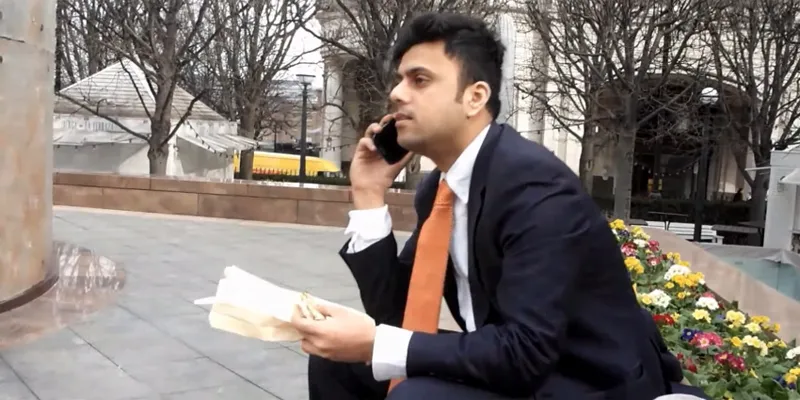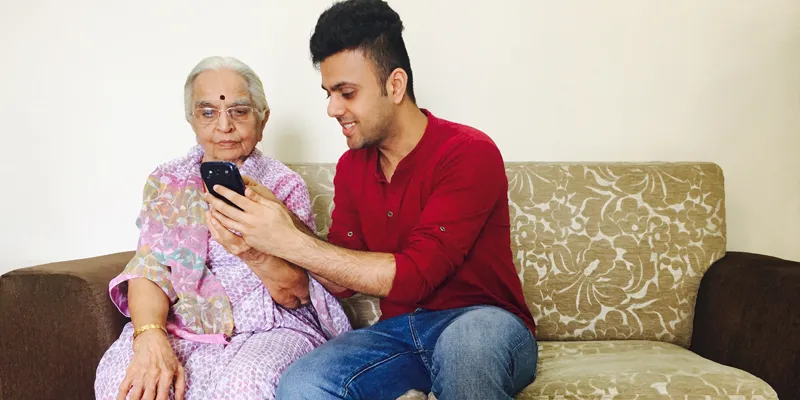Why did this 24-year-old London banker turn into a tiffinwala?
Sometimes, second helpings can cost a lot as Charles Dickens showed with Oliver Twist, the ‘boy who asked for more.’ But when 24-year-old Akshay Bhatia decided he wanted more from his colleagues’ lunch boxes it led to happy new beginnings for him.

A banker at Morgan Stanley in London, Akshay was tired of cold meals on the go. “I could not cook to save my life. I managed to even burn toast, always,” he tells YourStory from his home in Mumbai. The long hectic hours at an investment bank robbed whatever little flavor the fast food and Subway sandwiches contained. “I would wonder why I pay five pounds for a sandwich which is cold and prepared in bulk and does not suit my taste,” he says, recalling his struggles to find a decent affordable meal daily.
Like all single Indians living away from home, Akshay too started eyeing his colleagues’ lunch boxes.
There were many family guys who would bring dabbas. I would take a bite from their box but would be hesitant to take a second helping. I wanted to find a solution to get the second helping without appearing greedy.
This thought consumed him so much that he decided to actually write down his problem statement. “I first wrote down what my desire was. It was to have fresh home-cooked food. Then, I wrote down the solution: need someone to cook for me.” But that was easier said than done.
He decided to build a platform for sharing food with his colleagues. “But I realised that this may not work in a place like London. People are self-sufficient there. If they had lunch leftovers, they kept it for dinner. The habit and practice of sharing are more within the Asian community. My Indians colleagues told me to let them know when I wanted to eat something specific, but I felt I would be imposing on them, especially if they did not take any money in return,” says Akshay, recalling his dilemma.
Neighbour’s pride
As cities are expanding, families are becoming more insular. But when we catch a whiff of aroma floating past our windows, we always wish that we could taste what the neighbour is cooking. In January this year, when Akshay came home for a holiday, he decided to test his idea of a food sharing platform. He did a small survey at his residential colony in Powai, Mumbai. “I asked people what their food habits were, and whether they would like to eat someone else’s food. I found that people are still the same, and they want to taste their neighbour’s food.”
The idea that germinated in his head in London took root here in India.
I thought this was the only chance I would get to do something of my own. A few years down the line, I would be stuck in the corporate cycle.
Akshay, who went to the UK to do his undergraduate studies at the University of Warwick, graduated in 2011 with accounting and finance. He was subsequently picked up by Morgan Stanley, where he worked in the equity risk division for a year-and-a-half and then in the asset management division for another year-and-a-half. “In my three years there, I often questioned myself whether I was adding any real value to my work. I felt I was dispensable. If I quit, no one would miss me,” he says, adding, “I had decided my next move would probably be to work in a niche organization or start something of my own where I could make a significant change.”
Thus, it came as no surprise when he decided to go the whole hog with the food sharing platform idea. “We developed an app Mutterfly and beta tested it in my apartment complex first. People had to basically state what they would be sharing. We made an event of it asking people to gather for breakfast on a Sunday to taste what their neighbours had cooked,” says Akshay. It proved to be a big success. “Out of 120 flats, we had 70 people in the age-group of 40 to 60 participate,” he adds.
In the food race
Akshay did not return to work. After convincing his parents that his heart lay here, he went all out to turn his idea into a viable business. But he had to tackle his grandmother first. “I live in a joint family, and convincing my granny that I no longer wanted to return to London instead do this, was a tough task. She thought I had lost my mind to give up a job in an international bank and become a ‘tiffinwala’. She imagined me taking food orders over the phone,” says Akshay with a laugh.

Only if granny knew that the food services sector is touted to be a $50 billion market growing at 16-20% year on year. There is a new startup popping up practically every day catering to one or the other demand in this sector and technology is making this recipe simple indeed.
Akshay and his team of four, which include his mentor Jit Salunke, who has prior experience in running a food startup, tech guy Dhawal Mehta, and two freelancers, plan to open the app for the entire Mumbai city by this month end.
In the next four months, we want to focus on building an active food-sharing community across Mumbai neighbourhoods. In the next phase, we are planning to introduce some unique ways to monetize dishes that are priced.
They are also looking at other modes of revenue. “We found that a lot of home chefs want to use the app to establish their business. We are also planning to rope in small business like masala makers by including short videos on quick recipes using these masalas. Another long-term idea is to bring dessert makers to the platform, which can allow a person availing a neighbour’s dish to repay with sweets,” adds Akshay.
Akshay is going the bootstrapped way for now, using funds from his past investment bank job.







